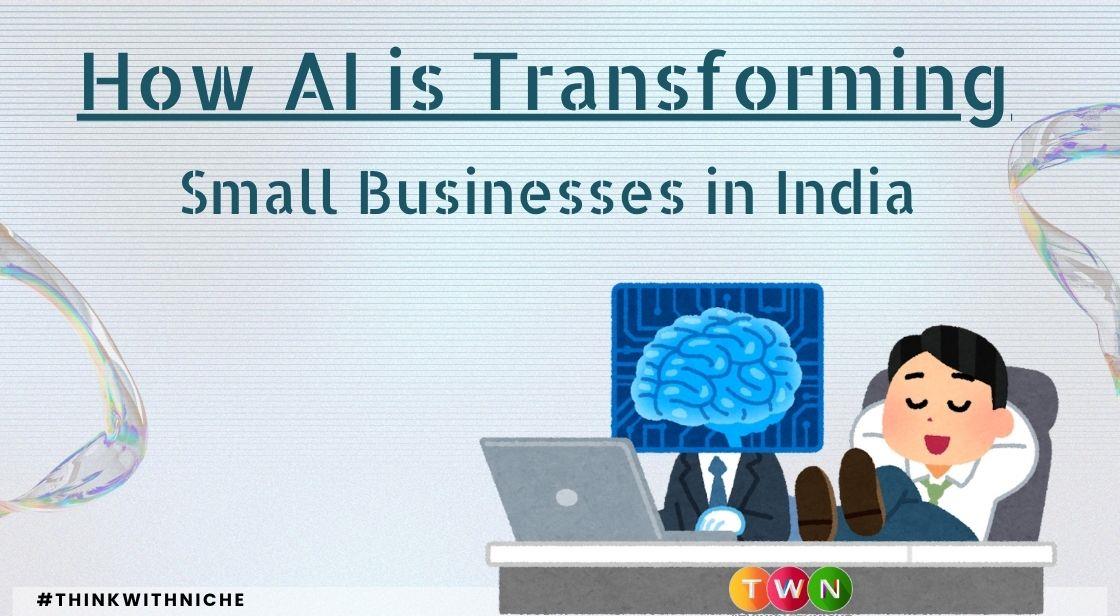How AI is Transforming Small Businesses in India: Trends, Tools & Impact

Blog Post
India's vibrant landscape of small and medium-sized businesses (SMBs) – the backbone of its economy, contributing over 30% to the GDP and employing millions – is undergoing a profound transformation driven by Artificial Intelligence (AI).
What was once considered the exclusive domain of large corporations is now becoming increasingly accessible and indispensable for smaller enterprises.
In 2025, AI is not just a buzzword; it's a powerful, affordable, and scalable tool revolutionizing how Indian entrepreneurs operate, enabling them to compete more effectively in a dynamic global market.
Recent data underscores this burgeoning adoption: a significant 23% of Indian businesses have already implemented AI, surpassing other global survey markets, with an impressive 73% planning to expand their AI usage in 2025.
Furthermore, a 2025 Intuit & ICIC report highlights that 89% of small businesses are relying on AI to automate repetitive tasks and boost efficiency, with India leading the way as 59% of SMBs have already integrated AI-driven solutions.
This surge is fueled by AI's capacity to streamline operations, enhance decision-making through data-driven insights, and personalize customer experiences, marking a new era of growth for India's small businesses.
How AI is Powering India’s Small Businesses
Artificial Intelligence is rapidly democratizing advanced capabilities for India's small and medium-sized businesses (SMBs), ushering in an era of unprecedented efficiency, data-driven decision-making, and enhanced customer engagement, thereby fueling their growth and competitiveness in the digital economy.
1. Automating for Unprecedented Efficiency
One of AI's most immediate and impactful contributions to Indian small and medium-sized businesses (SMBs) is the profound automation of routine, repetitive, and time-consuming tasks. This liberation from mundane administrative chores frees up invaluable human capital, allowing owners and employees to channel their energies and creativity towards strategic growth initiatives, innovation, and enhancing core business value.
The ripple effect is a dramatic increase in operational efficiency, a critical factor for competitiveness in India's fast-paced market.
Customer Service Chatbots: The Always-On Frontline
For a burgeoning e-commerce store in the vibrant markets of Jaipur selling artisanal handicrafts, or a local diagnostic clinic in the tech hub of Bangalore, the deployment of AI-powered chatbots has become a game-changer. These intelligent virtual assistants now handle a significant, often overwhelming, portion of customer inquiries around the clock, 24/7.
This includes proficiently answering frequently asked questions (FAQs), processing basic orders, managing appointment bookings, and efficiently resolving common customer issues. The result is a drastic reduction in response times, often from hours to mere seconds, leading to a substantial improvement in overall customer satisfaction.
Indeed, the adoption rates are staggering: a projected 80% of small businesses in India aim to integrate AI chatbots into their customer support strategies by the end of 2025. Early adopters are already reaping tangible benefits, with 95% reporting improved response quality and a remarkable 92% seeing reduced turnaround times for customer queries.
For instance, a small online saree boutique in Varanasi can leverage chatbots to answer queries about fabric types, shipping details, or return policies, even after business hours, ensuring potential customers are never left waiting. Similarly, a local coaching center in Lucknow can use a chatbot to handle admission inquiries, share course details, and schedule demo classes, thereby reducing the administrative burden on its staff.
Inventory and Supply Chain Management: Precision in Motion
AI systems are actively revolutionizing inventory management and optimizing supply chains for a wide spectrum of Indian small retailers and manufacturers. These sophisticated systems move beyond simple tracking; they intelligently analyze vast datasets, including historical sales figures, evolving market trends, and even external, often unpredictable, factors like regional festivals, seasonal shifts, or unexpected weather patterns, to predict future demand with remarkable accuracy.
This predictive capability enables highly efficient, automated reordering processes, thereby minimizing costly stockouts (lost sales) and equally detrimental overstocking (tying up capital). Furthermore, AI optimizes warehousing logistics, suggesting optimal storage locations and routes for picking, which enhances overall operational flow.
Consider a small garment manufacturer in Tiruppur, a textile hub. An AI-driven inventory system ensures the precise availability of raw materials like specific fabrics or threads, preventing costly production delays and significantly reducing material waste.
For a small-scale spice exporter in Kerala, AI can predict global demand fluctuations, optimizing procurement from local farmers and managing logistics to ensure timely and cost-effective shipments, minimizing spoilage and maximizing freshness.
The integration of IoT sensors with AI also allows for real-time monitoring of stock levels and even environmental conditions within warehouses, ensuring product integrity, especially for perishables.
Also Read: How AI Adoption Challenges Impact Business Success
Accounting and Financial Operations: Beyond Bookkeeping
The traditional complexities of accounting and financial management, often a significant drain on time and resources for Indian small businesses, are being fundamentally transformed by AI-powered software.
These advanced solutions automate a multitude of tasks, from the meticulous processing of invoices and diligent expense tracking to the complex reconciliation of accounts. Beyond mere automation, AI can now assist with real-time financial reporting, offering immediate insights into cash flow, profitability, and financial health.
Critically, AI algorithms are becoming adept at identifying potential discrepancies, anomalies, or even fraudulent activities by flagging unusual transaction patterns, offering an invaluable layer of security and oversight.
This empowerment provides small businesses with unprecedented levels of financial control and significantly reduces the reliance on extensive, error-prone manual bookkeeping.
For a growing startup in a Tier-2 city like Indore, an AI-powered accounting system can automatically categorize UPI and bank transactions, generate GST-compliant invoices, and prepare initial financial statements. This not only saves hundreds of hours annually but also provides the owner with an accurate, up-to-the-minute financial snapshot, enabling more informed strategic decisions on investments, pricing, or expansion.
As of 2025, many AI accounting tools are seamlessly integrating with existing payment gateways and banking platforms used by Indian SMBs, making their adoption smoother and more impactful.
2. Enabling Data-Driven Decision Making
Traditionally, market research and data analysis were prohibitively expensive for most small businesses. AI has democratized access to powerful analytical capabilities, turning raw data into actionable insights.
- Predictive Analytics: AI tools can analyze historical sales data, customer demographics, social media sentiment, and local trends to provide highly accurate sales forecasts. A small restaurant in Delhi can use AI to predict popular menu items for specific days or seasons, optimizing ingredient purchases and minimizing food waste.
- Market Intelligence: AI can scour vast amounts of online data, including competitor pricing, consumer reviews, and emerging market trends, to provide small businesses with competitive intelligence. This helps them identify new opportunities, refine their product offerings, and adjust pricing strategies in real-time.
- Personalized Customer Insights: By analyzing customer purchasing patterns and Browse behavior, AI helps small businesses understand individual customer preferences. This allows for hyper-personalized product recommendations, tailored marketing messages, and customized loyalty programs, fostering stronger customer relationships and driving repeat purchases.
3. Revolutionizing Marketing and Customer Acquisition
AI is making sophisticated marketing strategies accessible and affordable for even the smallest Indian businesses, allowing them to reach their target audience more effectively and efficiently.
- Targeted Advertising: AI-driven advertising platforms enable micro-targeting of potential customers on social media and other digital channels. A rural artisan selling handcrafted goods can use AI to identify and reach customers across India or globally who have shown interest in similar products, without needing a large marketing budget.
- Content Generation: Generative AI tools like ChatGPT and specialized AI content writers help small businesses create compelling marketing copy, blog posts, social media updates, and email newsletters quickly and at a fraction of the traditional cost. This is invaluable for businesses with limited in-house marketing teams.
- Search Engine Optimization (SEO): AI-powered SEO tools analyze search trends, competitor keywords, and content performance to help small businesses optimize their websites and online content for higher search engine rankings, increasing their organic visibility.
4. Sector-Specific AI Impact in India
AI's influence is permeating various sectors dominated by Indian small businesses, offering tailored solutions.
- Retail: Beyond chatbots and inventory, AI is enabling personalized shopping experiences, dynamic pricing, and even frictionless checkout systems for forward-thinking small retail outlets. It helps analyze in-store shopper behavior for optimized merchandising.
- Manufacturing (MSMEs): While AI adoption in Indian MSME manufacturing is still relatively low at around 15%, it holds immense potential. AI facilitates predictive maintenance for machinery, reducing downtime and maintenance costs. It improves quality control through automated inspection systems (e.g., IIT Kharagpur developing portable AI devices for MSME inspection). AI also supports smart supply chain management, optimizing inventory and logistics for smaller manufacturers.
- Services: AI chatbots and virtual assistants are widely used for customer support. AI also assists in lead generation, customer relationship management (CRM), and even personalized service delivery for small businesses in sectors like healthcare, education, and finance.
- Agriculture: AI is transforming farming practices for smallholder farmers. AI-powered applications, often integrated with satellite imagery and drone data, provide insights for crop yield prediction, efficient pest and weed control, optimized resource use (water, fertilizers), and early disease detection. Initiatives like the Pradhan Mantri Fasal Bima Yojana (PMFBY) are integrating AI for faster and more accurate crop assessment and timely claim settlements.
5. Government Initiatives and Support: Paving the AI Path for MSMEs
Recognizing AI's immense transformative potential as a catalyst for economic growth and inclusive development, the Indian government is proactively championing its adoption, with a particular focus on the crucial Micro, Small, and Medium Enterprises (MSME) sector. These strategic interventions are designed to democratize AI access, build a robust AI ecosystem, and cultivate the necessary talent pool.
The Ambitious IndiaAI Mission: AI for All
At the heart of India's national AI strategy is the ambitious IndiaAI Mission, officially approved in March 2024 with a substantial budget of ₹10,372 crore (approximately $1.25 billion) spread over five years. This mission embodies the Prime Minister's vision of 'AI for All', aiming to establish India as a global leader in artificial intelligence by focusing on seven foundational pillars. Beyond just funding, it focuses on building a comprehensive AI ecosystem. Key components include:
-
IndiaAI Compute: This pillar envisions building a high-end, scalable AI computing infrastructure with a target of over 10,000 Graphics Processing Units (GPUs). As of early 2025, the government has empaneled 10 bidders who have offered 14,517 GPUs, surpassing the initial target, at highly subsidized rates (around ₹100 per GPU hour) for researchers and startups. This is crucial for MSMEs looking to run complex AI models without investing in expensive hardware.
-
IndiaAI Datasets Platform: To fuel AI development, this platform will provide seamless access to high-quality, anonymized, and non-personal datasets. This will empower Indian startups and researchers, including those catering to MSMEs, to develop advanced AI applications specifically relevant to Indian contexts across sectors like agriculture, healthcare, and finance.
-
IndiaAI Innovation Centre (IAIC): This center fosters a collaborative environment, inviting proposals from startups, researchers, and entrepreneurs to build state-of-the-art foundational AI models trained on Indian datasets, encouraging indigenous solutions for unique Indian challenges.
Targeted Support for MSMEs: Bridging the Digital Divide
Beyond the overarching IndiaAI Mission, specific policies are being formulated and implemented to promote AI access and adoption for the vast MSME sector.
-
Dx-EDGE Platform: Launched by the Confederation of Indian Industry (CII) in collaboration with NITI Aayog and AICTE, Dx-EDGE serves as a crucial national initiative dedicated to facilitating digital transformation for MSMEs. It provides tailored AI tools for essential functions like inventory management, customer relationship management, and optimizing daily operations. For example, a small textile unit in Surat can access AI-powered tools through Dx-EDGE to streamline its production scheduling or manage customer inquiries more efficiently, without needing extensive technical expertise.
-
Centralized Digital Portal (within Udyam platform): NITI Aayog has recommended the creation of a dedicated sub-portal within the existing Udyam platform. This portal will feature scheme discovery tools, compliance support, and crucially, AI-based assistance to help MSMEs navigate various government resources and AI adoption pathways effectively. This aims to simplify access to information and support for businesses, from micro-enterprises to small manufacturers.
-
Technology Integration and Industry 4.0 Promotion: Government efforts are focused on upgrading existing Technology Centers into sector-specific and regionally customized India SME 4.0 Competence Centers. These centers are designed to actively promote the adoption of Industry 4.0 solutions, including AI, among MSMEs, helping them address technology obsolescence and boost productivity.
FutureSkills PRIME: Building the AI-Ready Workforce
A critical aspect of sustainable AI adoption is the availability of a skilled workforce. The FutureSkills PRIME initiative, a joint program between the Ministry of Electronics and Information Technology (MeitY) and NASSCOM, is central to this. This program focuses on re-skilling and up-skilling India's youth and professionals in emerging technologies, including AI, data science, machine learning, and blockchain.
By offering incentives for course completion and certifications, FutureSkills PRIME ensures a continuous supply of AI-literate talent. For an MSME looking to integrate AI into its operations, this means access to a workforce already familiar with AI tools or the ability to upskill existing employees. For instance, a small IT services firm in Pune can encourage its employees to undertake AI courses through FutureSkills PRIME, making them capable of developing and deploying AI solutions for their own clients. The program also conducts awareness sessions in Tier 2 and Tier 3 cities, helping bridge the digital skill gap outside major metropolitan areas.
Nurturing Indigenous AI: Sarvam AI and Krutrim
A significant strategic push is towards fostering indigenous AI capabilities, reducing reliance on foreign models, and developing solutions specifically tailored to India's unique linguistic and socio-economic context. Indian startups like Sarvam AI and Krutrim are leading this charge.
-
Sarvam AI: This Bengaluru-based startup is making waves by developing open-source foundational AI models that support over 10 major Indian languages, including Hindi, Bengali, Gujarati, and Tamil. Their focus on voice-enabled AI and building "agentic AI" (intelligent agents that can perform tasks autonomously) is highly relevant for Indian MSMEs, many of whom operate in diverse linguistic environments or require task-specific automation. Sarvam AI's models aim to simplify day-to-day operations and business processes for a truly "Bharat-centric" AI experience. They also emphasize sovereign AI development, ensuring data remains within India's borders.
-
Krutrim: Developed by Bhavish Aggarwal of Ola, Krutrim is another prominent Indian AI initiative focused on building multilingual conversational tools and large language models (LLMs) that understand and generate content in various Indian languages. While initially focused on the EV ecosystem, Krutrim's underlying LLM capabilities can be leveraged by diverse MSMEs for localized customer support, content creation, and data analysis, making AI accessible even to those with limited English proficiency.
These homegrown solutions offer not only affordability but also a deeper contextual understanding, making AI applications more intuitive and effective for the specific needs and diverse linguistic landscape of Indian small businesses, thereby significantly reducing reliance on foreign models and fostering true AI self-reliance.
6. Challenges and the Road Ahead
Despite the immense opportunities, Indian small businesses face unique challenges in AI adoption:
- Skill Gap: A significant challenge is the lack of AI expertise and digital literacy among small business owners and their employees. A 2025 Intuit & ICIC report notes that 20% of small business finance teams cite AI skill gaps as a major challenge.
- Data Quality and Availability: AI models thrive on clean, well-structured data. Many SMBs still rely on fragmented records or manual processes, hindering effective AI implementation.
-
Initial Investment and Integration: While AI tools are becoming more affordable, the initial cost of subscription, infrastructure upgrades, and integration with legacy systems can still be a barrier for cash-strapped businesses.
-
Awareness and Understanding: Some small business owners may lack awareness of the specific AI solutions available for their sector or misunderstand the tangible benefits they can derive.
- Infrastructure: Inconsistent internet connectivity and limited access to cloud-based services, especially in semi-urban and rural areas, can impede the scalability of AI applications.
To overcome these hurdles, continued efforts are needed in:
-
Affordable and User-Friendly Tools: Development of more plug-and-play AI solutions tailored for small business needs.
-
Training and Skilling Initiatives: Government and private sector collaborations to offer accessible training programs on AI tools and digital transformation.
-
Data Digitization: Encouraging and supporting small businesses in digitizing their records and building robust data foundations.
- Awareness Campaigns: Educating SMBs on the practical applications and ROI of AI.
Conclusion
AI is no longer a futuristic concept but a tangible, transformative force powering India's small businesses in 2025. From automating mundane tasks and enabling data-driven decisions to revolutionizing marketing and enhancing customer experiences, AI offers a competitive edge that was once unimaginable.
While challenges related to skills, data, and initial investment persist, concerted efforts from the government, technology providers, and the entrepreneurial ecosystem are paving the way for wider adoption. By embracing AI, Indian small businesses are not just improving their operational efficiency and profitability; they are actively contributing to India's vision of becoming a digitally empowered and economically dominant global player.
The future of India's small businesses is undeniably intelligent, driven by the power of AI.
You May Like
EDITOR’S CHOICE












